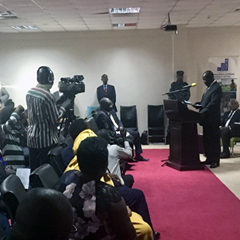[19 September 2018] -- Urban stakeholders from around the country gathered in Jinja for the first-ever Uganda Urban Expo from 5-9 September. On the agenda: How to enhance the role of secondary cities to promote economic development.
The groundbreaking event put the spotlight squarely on Uganda’s fast-growing secondary cities, their needs, and potential. The entire Expo was locally driven and organised, and it attracted a great deal of interest from local authorities, the national government, civil society, academia and the private sector.
The Uganda Urban Expo was organised by the Ministry of Lands, Housing and Urban Development, Jinja Municipal Council in collaboration with the Urban Authorities Association (UAAU), Chamber of Commerce and Industry and the Private Sector Foundation Uganda.
Representatives of some 30 Ugandan municipalities and delegates from over ten countries came together to discuss a broad range of issues relating to the investment readiness of secondary cities, from integrated urban planning to migration and refugees, public-private cooperation, repositioning secondary cities for job creation, green economy, use of big data and access to capital markets.
It was a significant success, and participants resolved to hold the Expo each year in a different secondary city – ensuring that secondary cities will remain high on the agenda in Uganda. The conference also adopted the Jinja Declaration on Secondary Cities, which is being finalised.
Activities centred around the theme of “Becoming investment ready: Unveiling the business and investment potential of secondary cities.” Participants attended learning workshops, browsed an exhibition of urban solutions and products, and went on field visits to see local projects and sites aligned with the expo’s theme.
They also had had a chance to network, explore new partnerships, and make their voices heard. With national-level ministers in attendance, mayors took advantage of the opportunity to advocate for more investment and interventions in secondary cities. Companies with innovative solutions to urban challenges were able to show their products and engage with urban managers, potentially leading to new relationships.
The learning sessions provided practical guidance to cities on how to become investment ready, how to promote equitable economic growth, and how to unlock the various potentials for investment and business promotion. The conversation throughout focused on an essential aspect: How to pay for municipal development.
Cities Alliance as a strategic partner
Cities Alliance hosted a session on SDGs and the New Urban Agenda as enablers of business and investment in secondary cities. During the session, Chief Risk Officer Britt Kerkenberg from Kommuninvest, a Swedish local government funding agency, presented the concept and explained how it works. The idea resonated among participants, who agreed to explore the possibility of a local government funding agency for Uganda.
We also hosted a second session with UNCDF on reaching out to capital and debt markets. In his keynote speech, Martin Onyach-Olaa, World Bank Senior Urban Specialist, explained the basic principles of creditworthiness for municipal financing. Discussions centred on the key issues that secondary cities face as they consider access to market-based long-term capital to address their pressing infrastructure needs, such as which projects are suitable for market-based finance, how to make projects attractive to providers of long-term capital, and the most suitable sources (equity, debt or their combination).
Support for the Expo is an extension of Cities Alliance’s long-term partnership with Uganda to strengthen the urban agenda in the country, through our Transforming the Settlements of the Urban Poor in Uganda Country Programme, the Future Cities Africa project, and the Equitable Economic Growth Campaign Cities initiative.
Cities Alliance was a strategic partner and sponsor in the Expo, along with UNCDF, Pulse Lab Kampala, BIDCO Africa, UNDP, UNHCR, UN-Habitat, the UN Economic Commission for Africa, and the International Organization for Migration.
The organisers recognised the value of this partnership and Cities Alliance’s support for the Expo since its inception. Majid Batambuze, the Mayor of Jinja, noted that “Cities Alliance does not only talk the talk, but also walk the walk.”
Secondary cities are key to economic growth
A key message that echoed throughout the Expo was the importance of investing in secondary cities to promote balanced regional development.
Often touted as engines of economic growth, secondary cities are teeming with business and investment opportunities that are under-exploited. If supported, secondary cities can play a vital role in creating employment, raising standards of living, taming open urban migration, and creating balanced and equitable development. An empowered and efficient system of secondary cities can double or even triple a country’s GDP, according to Managing Systems of Secondary Cities by Prof. Brian Roberts.
Many of today’s secondary cities, however, are struggling. While they are growing physically, there is no matching growth in productivity or living standards. They face inadequate funding, ever-increasing burdens on their infrastructure and services, as well as mounting environmental challenges – making it difficult to create a business-friendly, enabling environment for private sector investment.

“As a government we are committed to supporting secondary cities.” -- H.E. Edward Ssekandi, Vice President of Uganda, at the opening of the Expo.
Related Items
The Cities Alliance Transforming the Settlements of the Urban Poor in Uganda Programme
The Cities Alliance JWP for Equitable Economic Growth in Cities




